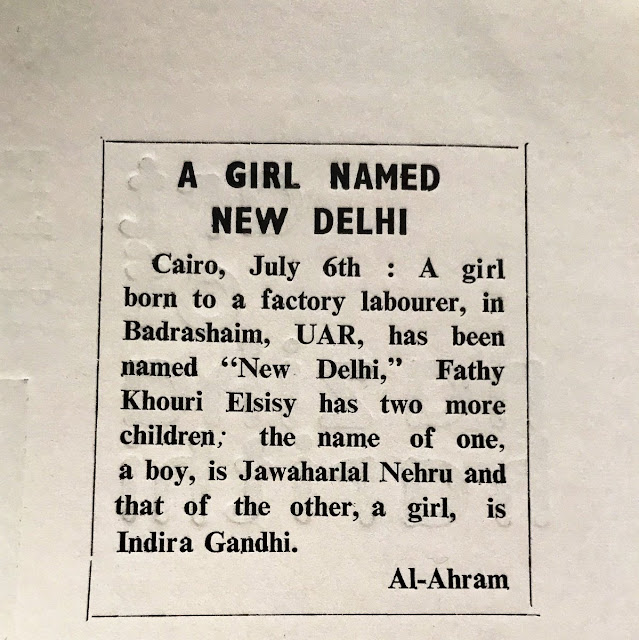... At the first meeting of the two delegations, a great crisis loomed over it. The Arab delegation was welcoming the Indian one. The minister and his colleagues sat in stunned silence as the unceasing Arab oratorial flood overwhelmed them, punctuated frequently by two words, ‘Bandit Nehru’.
The agitated minister whispered to me ‘Protest’! They are calling our leader a ‘bandit!’ I whispered back, ‘Later!’ at which the minister seemed quite furious.
During the tea-break I explained to the minister and his delegation that the Arabs have great respect and affection for our great leader, Pandit Nehru, but that in Arabic there is no letter ‘p’, but only ‘b’. In Egypt, therefore, we must tolerate, with a smile, Nehru being called a bandit.!
Apa B. Pant, Undiplomatic Incidents (Hyderabad: Sangam Books, 1987), 99.
Once when there were a number of students of Africa in Delhi, the story went around that they were being discriminated against while the European students were invited to homes and so on. This was not perhaps strictly true but certainly partially so. Bijju Bhabhi [Rameshwari Nehru] was infuriated. She learnt that the committee formed to look after the students was not doing much about it and herself became the Chairperson of the committee. Her first act was to arrange a big party for the Africans together, of course, with other nationalities and Indians. She had heard that one of the complaints of the Africans was their inability to get “dates”—not being familiar with modern slang Bijju Bhabi determined to rectify the complaint. In the middle of the tea-table was a large thali of lovely dates which she lovingly pointed out to the African guests not understanding why they lagged so much! Later it had to be explained what the word “date” meant and she had a good laugh at herself and immediately set about rounding up as many Indian girls as she could to be nice to the Africans!
Vijaya Lakshmi Pandit, “Bijju Bhabi,” in Om Prakash Paliwal, Rameshwari Nehru: Patriot and Internationalist (New Delhi: National Book Trust of India, 1986), 76.
All these stirring events had their immediate and powerful impact on Syria, which had supported Egypt vehemently in resisting Anglo-French coercion against the country and when Israel attacked Egypt, had considered herself immediately as being at war with her by virtue of the Arab Defence Treaty of 1955 and expected an imminent attack on her by Israel. Syrians are an emotional people and there was a great patriotic upsurge in the country, submerging temporarily all political differences and dissension. Martial Law proclaimed and feverish military preparations made to meet the expected attack from Israel which, curiously, never materialized. There was a strict black out in force at night in Damascus, with the eerie wailings of air raid sirens announcing an alert, followed by the all-clear later. Although no bombs fell, we have painful reasons to remember them, for during one of the air raid alerts while hurrying down the stairs in the dark to the basement below which had become our make-shift air raid shelter, Gauri, who was carrying our sleeping baby daughter Rupa on her shoulder, stumbled and Rupa’s forehead striking against the edge of one of the marble steps was cut open badly and starting bleeding alarmingly. No doctor could come during the alert and we tried—not very successfully—to stop the bleeding. The doctor arrived after the all-clear had been sounded and had to put a number of stitches and Rupa carries on her forehead the marks of the Suez War.
S.K. Banerji, From Dependence to Non-alignment: Experiences of an Indian Administrator and Diplomat (New Delhi : Enkay Publishers, 1987), 198-199.


No comments:
Post a Comment